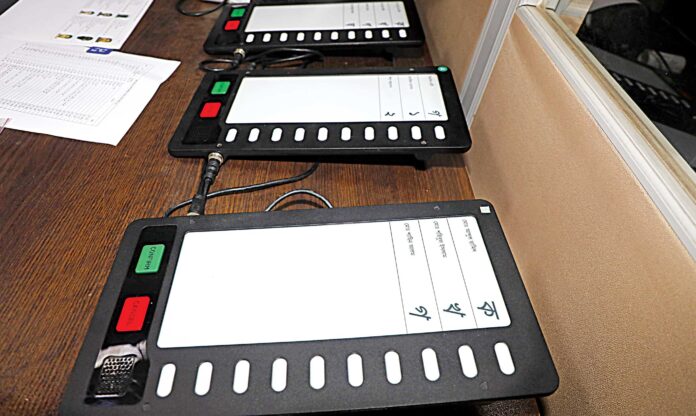The Election Commission of Pakistan (ECP) has decided to use modern technology in the upcoming general elections. The Election Commission has started a survey to figure out problems, including internet issues, in the district offices.
The Election Commission of Pakistan (ECP) continued its preparations for the next general elections and decided to use modern technology for the polls. The commission initiated a survey to identify internet and other technical issues in its district offices. Moreover, PTCL has been hired to ensure the use of modern technology. The district election commissioners have been instructed to fully cooperate with PTCL teams.
Electrical system upgrade and internet access will be ensured in the offices established at the district level and offices will be connected with fiber optic cables. The relevant election officers will be given access to the electoral system upgradation and the internet. The commission directed the district election commissioners to cooperate with the PTCL teams.
According to the Election Commission, modern technology will be installed in all district offices. A letter was sent to the offices established in Punjab, Sindh, Balochistan, and Khyber Pakhtunkhwa (K-P). In the upcoming general elections, the use of modern technology will help in generating timely results.
The Election Commission of Pakistan (ECP) estimates that the 2023 polls will cost the federal kitty over a thousand times more than the total cost of the last three general elections, which collectively stands at Rs28.6 billion.
A major part of the cost comes from the use of electronic voting arrangements for domestic and overseas voters. The estimated cost (Rs424 bn) of upcoming elections is almost closer to the budget of Pakistan’s largest province, Balochistan, which remained at Rs584.1bn for FY 2021-22.
Pakistan spent around Rs22 billion on the 2018 general elections, Rs4.73 billion in 2013, and Rs1.84 billion in 2008, ECP officials say.
Experts analyzing the election economy say that an additional Rs600 billion cost will emerge through candidates, supporters, financiers, and media advertisements. Experts have also predicted an expenditure of Rs5,000 per registered voter in 859 constituencies (directly elected National Assembly and provincial assembly seats) in the country.
Under the new election law, candidates can spend Rs10 per voter (Rs4 million for an average voters’ pool of 400,000 for the National Assembly and Rs2 million for about 200,000 voters in the provincial assemblies). Experts say that generally contestants and political parties spend much more and their expenditures increase manifold while running their campaigns.
If Pakistan acquires 900,000 EVMs from a third party, experts believe that each EVM would cost $1,500 (Rs262,500) which would collectively cost the national exchequer Rs230 billion. Experts say that if Pakistan locally produces EVMs, it may cost slightly over $1,000 (Rs170,000) per EVM, with a collective cost of Rs157 billion. The ECP officials also say that if one million overseas Pakistanis cast their vote, then it would cost an additional Rs10,000 per vote, with a total cost of Rs100 billion.
Electronic voting systems are one of the ways to strengthen the democratic process in the 21st century by allowing voters to reflect their own opinions. Machines or electronic equipment are used to cast votes so the overall process is known as Electronic Voting Machine or ‘EVM’. Its other name is ‘e-voting’.
In the electronic process, it is capable of both accurate application of votes and speedy counting of votes. It has also gradually gained acceptance across the world as a transparent and fair area of voting. The EVM system was first observed in 1964 in the elections of 7 states of the United States; Gradually the issue of taking votes through punch cards became popular.
Read More:











